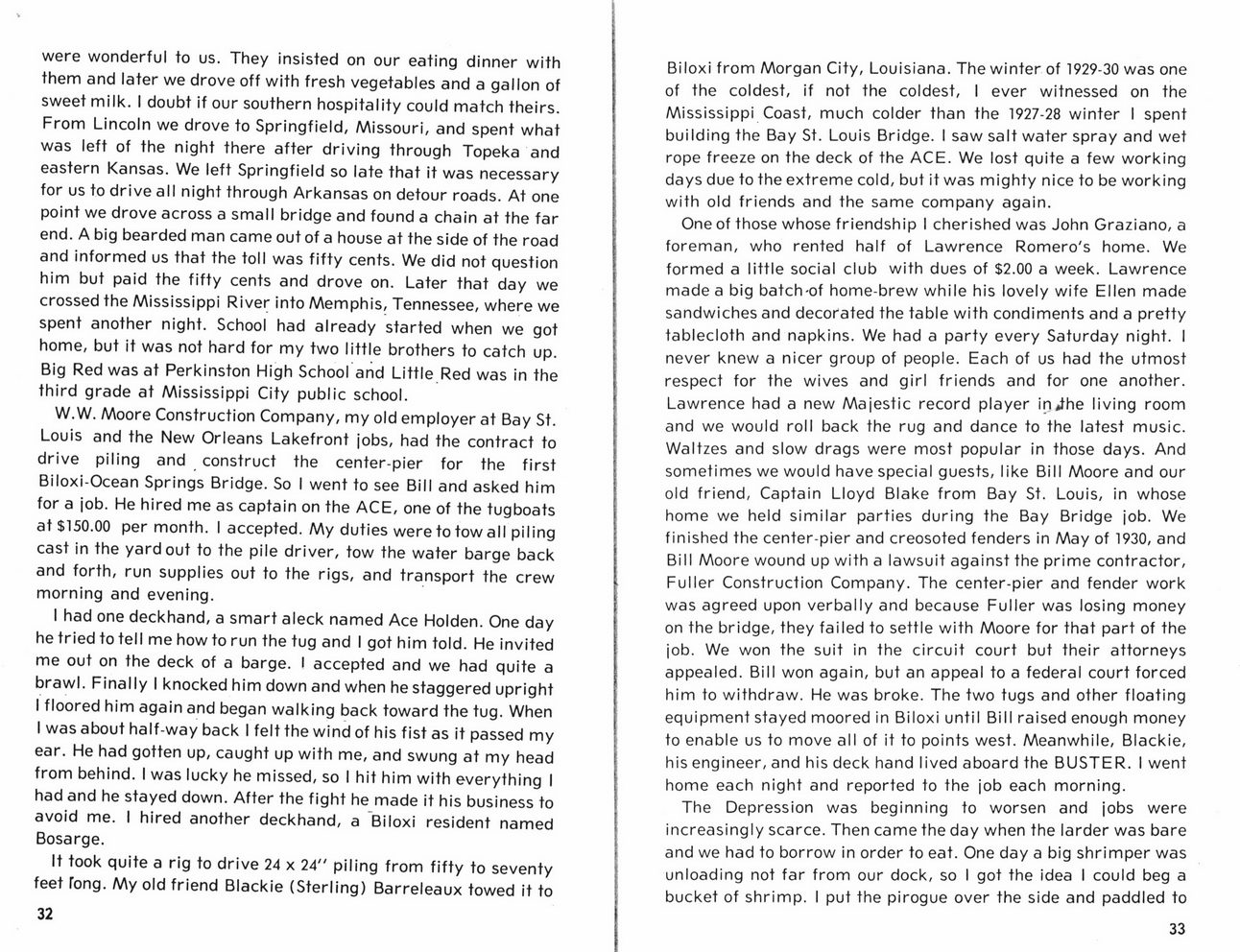This text was obtained via automated optical character recognition.
It has not been edited and may therefore contain several errors.
were wonderful to us. They insisted on our eating dinner with them and later we drove off with fresh vegetables and a gallon of sweet milk. I doubt if our southern hospitality could match theirs. From Lincoln we drove to Springfield, Missouri, and spent what was left of the night there after driving through Topeka and eastern Kansas. We left Springfield so late that it was necessary for us to drive all night through Arkansas on detour roads. At one point we drove across a small bridge and found a chain at the far end. A big bearded man came out of a house at the side of the road and informed us that the toll was fifty cents. We did not question him but paid the fifty cents and drove on. Later that day we crossed the Mississippi River into Memphis, Tennessee, where we spent another night. School had already started when we got home, but it was not hard for my two little brothers to catch up. Big Red was at Perkinston High School and Little Red was in the third grade at Mississippi City public school. W.W. Moore Construction Company, my old employer at Bay St. Louis and the New Orleans Lakefront jobs, had the contract to drive piling and construct the center-pier for the first Biloxi-Ocean Springs Bridge. So I went to see Bill and asked him for a job. He hired me as captain on the ACE, one of the tugboats at $150.00 per month. I accepted. My duties were to tow all piling cast in the yard out to the pile driver, tow the water barge back and forth, run supplies out to the rigs, and transport the crew morning and evening. I had one deckhand, a smart aleck named Ace Holden. One day he tried to tell me howto run the tug and I got him told. He invited me out on the deck of a barge. I accepted and we had quite a brawl. Finally I knocked him down and when he staggered upright I floored him again and began walking back toward the tug. When I was about half-way back I felt the wind of his fist as it passed my ear. He had gotten up, caught up with me, and swung at my head from behind. I was lucky he missed, so I hit him with everything I had and he stayed down. After the fight he made it his business to avoid me. I hired another deckhand, a Biloxi resident named Bosarge. It took quite a rig to drive 24 x 24" piling from fifty to seventy feet Tong. My old friend Blackie (Sterling) Barreleaux towed it to 32 Biloxi from Morgan City, Louisiana. The winter of 1929-30 was one of the coldest, if not the coldest, I ever witnessed on the Mississippi Coast, much colder than the 1927-28 winter I spent building the Bay St. Louis Bridge. I saw salt water spray and wet rope freeze on the deck of the ACE. We lost quite a few working days due to the extreme cold, but it was mighty nice to be working with old friends and the same company again. One of those whose friendship I cherished was John Graziano, a foreman, who rented half of Lawrence Romero's home. We formed a little social club with dues of $2.00 a week. Lawrence made a big batch-of home-brew while his lovely wife Ellen made sandwiches and decorated the table with condiments and a pretty tablecloth and napkins. We had a party every Saturday night. I never knew a nicer group of people. Each of us had the utmost respect for the wives and girl friends and for one another. Lawrence had a new Majestic record player injhe living room and we would roll back the rug and dance to the latest music. Waltzes and slow drags were most popular in those days. And sometimes we would have special guests, like Bill Moore and our old friend, Captain Lloyd Blake from Bay St. Louis, in whose home we held similar parties during the Bay Bridge job. We finished the center-pier and creosoted fenders in May of 1930, and Bill Moore wound up with a lawsuit against the prime contractor, Fuller Construction Company. The center-pier and fender work was agreed upon verbally and because Fuller was losing money on the bridge, they failed to settle with Moore for that part of the job. We won the suit in the circuit court but their attorneys appealed. Bill won again, but an appeal to a federal court forced him to withdraw. He was broke. The two tugs and other floating equipment stayed moored in Biloxi until Bill raised enough money to enable us to move all of it to points west. Meanwhile, Blackie, his engineer, and his deck hand lived aboard the BUSTER. I went home each night and reported to the job each morning. The Depression was beginning to worsen and jobs were increasingly scarce. Then came the day when the larder was bare and we had to borrow in order to eat. One day a big shrimper was unloading not far from our dock, so I got the idea I could beg a bucket of shrimp. I put the pirogue over the side and paddled to 33

True, Jim Yours Truly-018